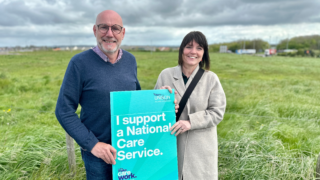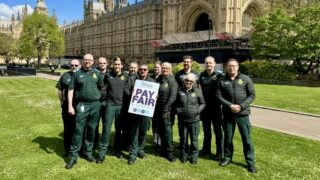Local government spending cuts have left councils in the South West unable to meet the needs of local communities and, in some cases, are putting the public at risk.
A survey, released to coincide with the union’s local government conference, reveals that eight in ten (82%) of council workers have no confidence in the future of local services, and (49%) are thinking of leaving their jobs for less stressful work elsewhere.
The survey – of 966 local government employees working across all services – reveals that 72% say residents don’t receive help and support when they need it, and 60% are not confident vulnerable residents are safe and cared for.
Council staff who took part shared stories of families living in mouldy, overcrowded properties; fly-tipping being left for weeks; increasing rodent populations; residents’ cars damaged by huge potholes; and vulnerable children, young people and adults not getting the help and support they need.
A recent National Audit Office* (NAO) report revealed that government funding for local authorities in England has fallen by an estimated 49% (in real terms) from 2010-11 to 2017-18. In UNISON’s survey, an overwhelming 88% of respondents in the South West admitted these cuts have had a negative impact on their ability to do the job as well as they can.
While local authorities have protected spending on statutory service areas such as adult and children’s social care, the amount they spend on other areas like parks and libraries has fallen sharply, says UNISON.
Worryingly, over half (58%) of those who responded believe their council no longer delivers quality services, and 53% that their employer doesn’t make the right decisions for the public. Additionally, two-thirds (68%) are concerned about the financial situation of their council.
Council workers identified a lack of front line staff (61%), adult social care (64%), safeguarding children and young people (47%), a lack of housing options (47%) and homelessness (42%) as the biggest challenges facing local authorities in the South West.
Almost three-quarters (73%) of those surveyed said there had been redundancies in their departments and as a result, three in five (62%) don’t feel secure in their jobs. Many spoke of colleagues leaving and not being replaced, causing those remaining to pick up the extra work.
As a result, over half (56%) said their workload is unmanageable and another three in five (64%) that they regularly work beyond their contracted hours.
UNISON South West head of local government Gav Brooks said:
“Local services are collapsing and council workers are being left to pick up the pieces and do the best they can amid the chaos. This disturbing survey should ring alarm bells in Whitehall and alert ministers to the crisis happening in councils across the South West.
“Local authorities have had to cut so many vital services that they have now reached a point where vulnerable children and the elderly struggle to get the help that they need, entire communities are suffering, and the public are being put at risk.
“With cuts to road and bridge maintenance, potholes in roads are left unfilled, and bridges are at risk of crumbling. Crematoriums are not maintained, streetlights stay broken, and parks are in disrepair as councils don’t have the equipment or the staff to adequately maintain them.
“There are now over one million people with an unmet need for social care because councils don’t have the resources to support them. Now is the time to reverse these cuts and invest in local government once more or the very fabric of our society will come unstuck.”
What council employees are saying:
A street cleaner in Wiltshire said: “Resources have been cut way past the bone. I used to litter pick a number of streets and then take up to four truck load of fly tip off the streets to the dump before lunch, then use a road sweeper in the afternoon. Now they deploy one man with a wheelbarrow to cover the same area.
“The drastic cuts mean our council has failed to comply with environmental legislation. Councils are meant to monitor areas and in residential areas resolve the problem within hours, not days, weeks or months. The rodent population has increased dramatically in the last two years and the risk to public health is now visible.”
A highway and environment manager in the South West said: “I dread taking holidays as there is no cover so all it means is sinking further behind. Similarly evenings and weekends no longer provide respite from work as I can no longer really switch off. We used to describe being busy and pulled all ways as “fire-fighting”. I describe the current situation as being “engulfed in flames”
Are you a council employee or contracted worker providing council services? Email southwest@unison.co.uk with your experience of cuts.





